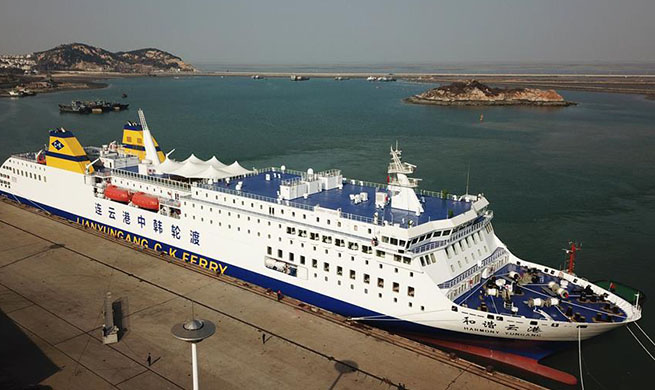by Olatunji Saliu
ABUJA, Dec. 16 (Xinhua) -- Leaving the city of Benin where he had lived all his life in southern Nigeria last year to seek greener pasture, Harrison Okotie had a strong conviction that wealth and opportunities were waiting for him at his destination in Europe.
Okotie left behind everything he had, including his wife and two kids, harboring the hope of returning home with enough money to take care of his family.
His dangerous dream saw him traveling through Agadez, where the desert journey from Africa to Europe usually begins, without food and water.
Soon as he arrived Libya, reality dawned on him and other travelers who trekked to the north African country, seen as a gateway for illegal migrants to enter Europe.
"We were greeted with inhuman treatments. I realized very quickly that there's no place like home," Okotie told reporters upon arrival in Nigeria, as he rued his "hellish experience" in Libya.
"I will never in my life think of leaving my country again. Whether there is work or no work, I will stay here and manage with my family."
The 35 years old is one of the thousands of Nigerians who voluntarily returned home recently with the assistance from the Nigerian government and the International Organization for Migration (IOM), a UN agency, following exposure of harsh conditions in detention camps where African migrants had been held in Libya.
Scores of Nigerians travel to Libya daily with the hope of landing in Europe on often deadly boat trips through the Mediterranean.
Though some made their ways to Italy, many are trapped in Libya and even sold as slaves, according to recent media reports that sent shockwaves across Africa.
Thousands of Nigerians are still stranded in Libya, living in terrible conditions in detention camps, with many desirous of the opportunity to return home.
Not a few of the returnees have alleged that they were sold at the Libya slave auction market.
Reuben Obi, one of the lucky returnees, said he made the decision to leave Nigeria early this year when he had no one to sponsor him to school.
Narrating his experience, Obi recounted how he had escaped death in the Mediterranean and spent six months in a Libyan prison.
"Before leaving Nigeria, my mother, who could have helped me, died due to a stomach problem. I had no other means and I decided to use the little money I saved to travel through the land. I left with no place in mind; I was looking at Germany or Italy to do any work that comes my way."
"There is plenty of stress and disaster while traveling to Libya by road. In addition to this, my boat capsized and many people were carried away by water. I was one of the people rescued by local fishermen and was later arrested. I was in prison for six months in Libya before being taken to a deportation camp," he said.
For most of the migrants, their ordeals began with local travel agents who often led them through the desert before handing them over to their Libyan collaborators in exchange for money.
Alex Otoide, another Nigerian returnee from Libya, told Xinhua he witnessed how 25 Nigerians, who were ferried from Nigeria to Libya by a trafficker, perished in the Sahara Desert.
Otoide said seven members of the group he traveled with also died inside a Libyan jail, noting there were 55 in the group.
"Those seven people died from hunger and thirst inside the prison," he said. "They (the traffickers) sold about 20 girls in the night. I saw it all," he said.
Earlier last month, Nigerian officials confirmed 26 Nigerian citizens dead in the Mediterranean while traveling to Italy from Libya. Two suspects, an Egyptian and a Libyan, were immediately arrested by Italian investigators.
Last week, the Nigerian government said it had identified 2,778 of its citizens languishing in detention camps in Libya.
As the identification exercise continues, those that were already identified were issued emergency travel certificates, the Nigerian foreign ministry said. The Nigerian government has vowed to make the repatriation a continuous exercise.
Meanwhile, the IOM said many Nigeria returnees from Libya had psychiatric issues.
Noting up to 4,500 irregular Nigerian migrants had returned from Libya between January and November, head of the global organization in Nigeria, Enira Krdzalic, said the number of deaths and those suffering exploitation and abuse along the central Mediterranean migration route is at an alarming rate.
"Crossing the Mediterranean is by far the deadliest route, with one death recorded for 35 arrivals. European statistics show that the amount of migrants from West Africa in migration flows to Europe have continued to increase, despite the perilous conditions of making the journey irregularly," she said.

















